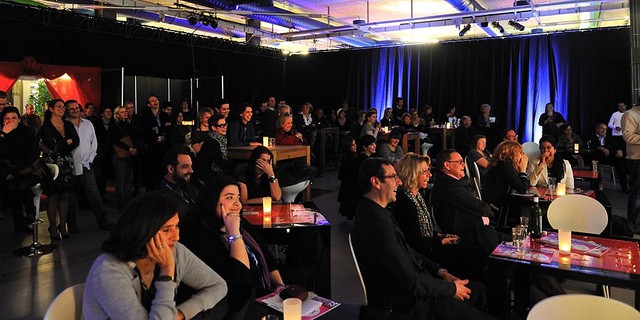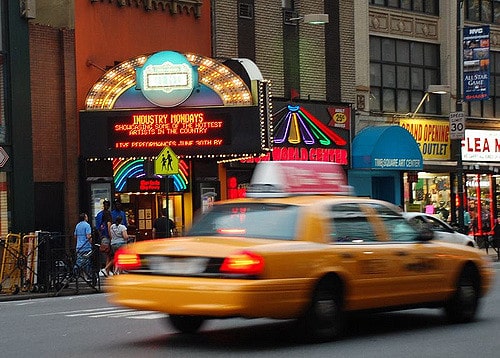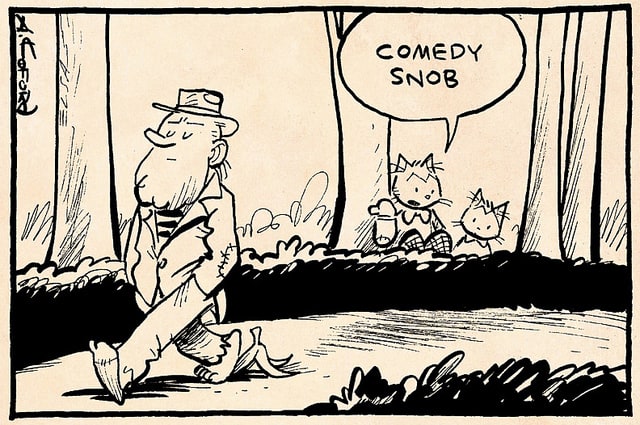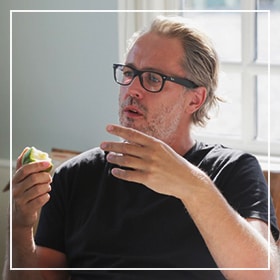“Why are stand-up comedians better anthropologists than I am?”
A few years ago, I started asking myself that question. As an anthropologist, I am supposed to know about all the cultural stuff that goes on when people get together: How we make sense of each other and all the weird habits that we come up with. For instance, why people in some parts of the world sleep with dogs in their beds whereas, in other places, dogs are considered as a favorite dish. Anthropologists make their living by thinking long and hard about such important issues.
But since I first saw George Carlin do his amazing bit about the seven dirty words that you cannot say, I have been haunted by the slightly uncomfortable thought that perhaps comedians are better anthropologists than I can ever be.
Much better, in fact. In just a few sentences, Carlin says more about social hypocrisy and everyday censorship than I can cram into a 40 page high-browed academic tirade. Over time, the idea emerged that perhaps I could somehow study comedians as they hone their skills and thereby come to understand why they are as good anthropologists as they are. To be perfectly honest, I wanted to steal their secret. This year, it has finally happened! From January to June 2017 I am in New York with one objective: To study how comedians work. And, as agonizing and painful as it will undoubtedly be, to do stand-up myself.
Marc Maron comes to the rescue
In Denmark, stand-up comedy has never been considered as an art form. There are a few comedy clubs in Copenhagen (the capital of Denmark) and one in Aarhus (Denmark’s 2nd largest city), but it is rare that Danes choose a comedy show as their evening entertainment. Unless the local beer garden is closed, of course. Stand-up comedy has been an essential part of popular culture in the US since the 1950s but it is only within the last 10-15 years that it has become a household phenomenon in Denmark. Even today, we don’t have a Danish comedy channel or regular late night talk shows where up-and-coming comedians are profiled.
We have been living in the dark ages of comedy for a very, very long time.
Most of my life, I have therefore been blissfully ignorant about the world of comedy. Of course I knew that Steve Martin existed and had lived a childhood as a black sharecropper and that Eddie Murphy looked his absolute best in a red leather suit, but I did not understand how important comedy was to American popular culture. A few years ago, I started to watch a lot of YouTube clips of comedians being interviewed on late night talk shows. Initially I used it as a way of avoiding lethal boredom while brushing my teeth at night but the YouTube clips soon invaded my work life also. Several times during the day I would stop whatever I was doing to find one more clip of Robin Williams’s maniacal ramblings on Letterman or Albert Brooks cracking up Johnny Carson with his absurd inventions. Those clips fascinated me but I couldn’t figure out why.

It was only when I started listening to Marc Maron’s amazing podcast series WTF that I realized why I had found those clips so incredibly fascinating. In Maron’s insightful interviews with some of the world’s greatest comedians, they discuss talk show interviews and how comics would prepare bits to be used during their conversation with the host weeks in advance. I simply did not know that: The dialogues between guests and hosts were often not regular conversations – they were prepared comedy bits! This must sound incredibly naïve to Americans having been spoon fed with late night talk shows since infancy but please bear with me: As I mentioned earlier, Danes have been living in the comedy dark ages for a very long time. Even today, a Danish talk show interview is usually a serious conversation between two serious adults talking about serious and adult things.
It might not have been the intention with these talk shows but you do die a little every time you watch them.
And then, suddenly, I was watching talk show interviews, which were amazing performances of beautifully crafted bits and improvised madness. I loved it!
Comedians are better anthropologists than I am
I began to use Marc Maron’s interviews as a menu for my daily consumption of comedy. Within days, I was incessantly devouring clips with Patton Oswalt, Sarah Silverman and Zach Galifianakis. Oh, and Maria Bamford! I must have watched every single YouTube clip that exist of her.

But it was only when I discovered Louis CK that I began to think of comedy in relation to my work as an anthropologist. I have never laughed as hard as when I was watching “Louis CK: Live at the Beacon Theatre”. I remember having to pause the show several times to catch my breath and wipe my eyes. I honestly think that Louis CK is the funniest person in the universe. And he is extremely insightful. A comedic philosopher. In the opening monologue to his last SNL performance, he discusses “mild racism”: “I have mild racism. It’s the best I could do coming out of the 70s, ’cause it was a very racist decade”. Louis CK admits to being surprised when finding out that a pizza restaurant was “run by four black women… You don’t usually see that; four black women running a pizza place”. Then he gives the example of being in a gas station late at night when a young man comes in wearing a hooded sweat shirt. “If he is white, I’ll think ‘oh, he’s an athlete. If he is black, unless he has a big smile on his face, then I become mildly racist and this is what I think: ‘That’s fine… everything is fine… (looks at the audience with a nervous stare) Nothing is going to happen. Of course I am fine. Why did I even think that for a second.'”
In just a few sentences, Louis CK manages to articulate a deep insight about everyday racism – and being very funny at the same time. To me, he had essentially made an anthropological observation: he registered something important about what happens when people with different backgrounds interact and (mis)interpret each other’s actions. And he got the message across in an easily accessible format – a joke – without sacrificing the nuances of the insight. Not bad! It left me with a burning desire to explore how he and other comedians do it: How do comedians become better anthropologists than me?
I spent almost a year developing an idea for a research project that would hopefully get me to New York to study the wild and exotic stand-up comedians in their natural habitat.
In collaboration with a Scottish colleague, I ended up submitting an application for a project composed of five sub-projects of which my study on stand-up comedy is one. Just before Christmas 2015, we received the good news: The project had been approved. I was going to New York!
Comedians in their natural habitat
I arrived in New York 29 December 2016 with my wife and two sons and 11 January I went to my first comedy shows. It was an early show at the Stand with Aaron Berg as energetic host introducing a long list of comedians I would come to see many times again over the next couple of months. I remember being really taken aback by the intensity of Berg’s crowd work. When he entered the room, people were quietly chatting at the tables and 5 minutes later, he had the audience roaring with laughter. And I remember laughing hysterically at Ben Bailey’s quirky observations (“should we briefly address how close my head is to the ceiling?”)
My plan was to go to at least 3 comedy shows each week and talk to as many comedians as possible about their craft.
A colleague had put me in contact with Justin Herman, an excellent writer and comedian, who is making a name for himself at comedy venues throughout the city. On a rainy day in mid-January, we met up at a café in Cobble Hill where Justin gave me a brief introduction to the art of joke-writing and carefully described the layout of New York’s comedy world. Justin also introduced me to Liz Miele, who is a very funny comedian with a unique approach and wonderful laid-back rhythm. Besides providing me with crucial insights about the craft of comedy, Liz has been incredibly generous in connecting me with both up-and-coming and established comedians in New York.

Since then, I have met up with many funny and insightful comedians, who openheartedly feed me with invaluable insights about their art: Shane Torres, Lance Weiss, Nore Davis, Yedoye Travis, Ian Fidance, Kyle Ayers, Khalid Rahmaan. The list continues.
What I know about comedy so far
Three observations from my interviews so far: First, comedy is hard work! All of those comedians I have interviewed so far work very, very hard on honing their skills. In order to make good comedy, you need to have a heightened awareness about everything that goes on around you – and you need to get as much stage time as possible even if this involves performing for two drunk foreigners and a nosey researcher (…who is also a foreigner…). Second, comedy requires honesty and boldness. Comedians draw on material from their own lives and do not hesitate to expose the darkest layers of human existence: mental instabilities, dysfunctional families, substance abuse, broken relationships.
I am truly in awe of the fearlessness and persistence with which many of the comedians I have met expose the most intimate sides of their personal lives in order to make the performances as fun, honest and real as possible.
And, third, the art and craft of comedy cannot be taught. You can learn about the structure of a joke – setup and punchline, tags and segways – but you will not get to understand what comedy is without experiencing it firsthand.
It took me a while to appreciate what the implications of the last insight had to be but in mid-February, on the train home after having seen Justin Herman do a great set at QED in Queens, I realized what I had to do. A key aspect of being an anthropologist is our methodological approach, which is called ‘participant-observation’. This basically implies that we do whatever the people we are studying are doing – and make observations about it in little notebooks every time we go to the toilet. That’s why, by the way, that anthropologists run to the toilet all the time. Sitting on the N train that night, it dawned on me that I actually hadn’t done my job properly. I had talked to comedians about their craft and gone to comedy shows but I hadn’t tried to do comedy. There was no way around it: I had to enter the world of comedy myself.
In order to learn the craft of comedy, I had to become a comedian!
Can anthropologists be funny?
Although comedy cannot be taught, I decided that some formal teaching would probably be a good idea before venturing into the unknown world of comedy on my own. I signed up for Veronica Mosey’s course through the Comedy Cellar and Tuesday 28 February I showed up for our first class. 10 students had signed up for the course and during three intensive hours, Veronica gave us a first taste of what is to come. I had expected the first class to be a soft start where we would be introduced to the basic ground rules of comedy but we would definitively not be doing jokes yet. It was clear from the beginning, however, that Veronica wanted us to try out any joke material that we might already have.
I had a half-baked idea for a joke, which I introduced with a weak and not particularly convincing voice.
And let me just say that the response was not overwhelming. Here’s the idea: My mother once admitted to me that she was disappointed with my looks when I was born. Apparently, my head was pear-shaped and my mother’s immediate impression was that it looked weird. She actually said that to me when I was about 12 years old! So, sitting with the other aspiring comedians, I told that anecdote and continued: “Only recently did I realize that she might not have been completely mistaken about the fruit-shape of my head. I was standing in the fruit section in our local Keyfood and this guy started looking at me in a weird way. He kept going between looking at the pear in his hand and looking directly at me. At one point he started nodding, as if he had suddenly realized something and then he said: “I know what you are doing…” To be fair, I know that it is not a good joke! But I felt really proud of myself. It was a fun idea, I thought, and I had given it a great twist. At that moment, I wouldn’t have been surprised if Veronica had asked me if she could use it in her show. I would have said yes. But instead: Total silence! After a brief pause, the person next to me cleared her throat and looked at me: “I don’t get what the Keyfood guy was on about…”. Veronica intervened: “I think it needs a bit more work, Morten. It just doesn’t sound realistic”.
Besides making me realize that I am probably not yet capable of crafting a joke that is genuinely funny (to other than myself, that is!), the first class also proved to me that comedians truly are some of the finest artists I have ever come across.
To be able to make a joke work in front of a room full of strangers; that is art in its purest form!
So, let me finish with the best joke I have heard during my short time in New York. It’s pretty dark but I just find it insanely funny. I heard Adrienne Iapalucci do it on the Artie Lang Show. Here it is: “My boyfriend told me he was going to kill himself and I was like: ‘great, now I won’t be able to kill myself or people will think we were in love”.
Featured image (cropped) by Moayn Brenn (flickr.com, CC BY 2.0)





